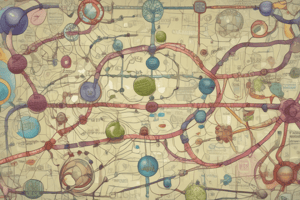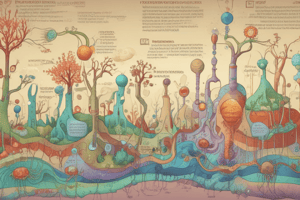Podcast
Questions and Answers
What is required for the reversal of the glyceraldehyde-3-phosphate dehydrogenase reaction?
What is required for the reversal of the glyceraldehyde-3-phosphate dehydrogenase reaction?
- NADPH
- ATP
- NADH (correct)
- FADH2
When pyruvate is the gluconeogenic substrate, which reaction supplies NADH?
When pyruvate is the gluconeogenic substrate, which reaction supplies NADH?
- Lactate dehydrogenase reaction
- Glyceraldehyde-3-phosphate dehydrogenase reaction
- Pyruvate kinase reaction
- Malate dehydrogenase reaction (correct)
What is the product of the condensation of 1 mole of DHAP and 1 mole of glyceraldehyde-3-phosphate?
What is the product of the condensation of 1 mole of DHAP and 1 mole of glyceraldehyde-3-phosphate?
- Fructose-1,6-bisphosphate (correct)
- Glucose-6-phosphate
- Pyruvate
- Fructose-6-phosphate
What is the function of glucose-6-phosphatase in hepatocytes?
What is the function of glucose-6-phosphatase in hepatocytes?
Which three reactions of glycolysis are bypassed during gluconeogenesis?
Which three reactions of glycolysis are bypassed during gluconeogenesis?
What is the fate of glucose-6-phosphate produced in non-hepatic tissues?
What is the fate of glucose-6-phosphate produced in non-hepatic tissues?
What is the function of gluconeogenesis in skeletal muscle?
What is the function of gluconeogenesis in skeletal muscle?
What is the product of the reaction catalyzed by the enzyme pyruvate carboxylase?
What is the product of the reaction catalyzed by the enzyme pyruvate carboxylase?
What is the primary function of gluconeogenesis?
What is the primary function of gluconeogenesis?
Which of the following is NOT a substrate for gluconeogenesis?
Which of the following is NOT a substrate for gluconeogenesis?
What is the primary site of gluconeogenesis in the body?
What is the primary site of gluconeogenesis in the body?
Which of the following enzymes is NOT involved in gluconeogenesis?
Which of the following enzymes is NOT involved in gluconeogenesis?
Why is gluconeogenesis considered energetically expensive?
Why is gluconeogenesis considered energetically expensive?
Which organ relies primarily on glucose as its energy source?
Which organ relies primarily on glucose as its energy source?
What is the alternative energy source for the brain during starvation?
What is the alternative energy source for the brain during starvation?
What is the relationship between gluconeogenesis and glycolysis?
What is the relationship between gluconeogenesis and glycolysis?
Study Notes
Gluconeogenesis Overview
- Gluconeogenesis is a metabolic pathway that generates glucose from non-carbohydrate carbon substrates such as lactate, glycerol, and glucogenic amino acids.
- It is one of the two main mechanisms the body uses to maintain blood glucose levels and prevent hypoglycemia.
- Glucose is the sole energy source for the brain, testes, erythrocytes, and kidney medulla.
Importance of Gluconeogenesis
- During starvation, the brain can derive energy from ketone bodies instead of glucose.
- The liver is the major site of gluconeogenesis, with the kidney also playing an important role.
- Gluconeogenesis is necessary for maintaining blood glucose levels, particularly during fasting or starvation.
Key Enzymes
- Pyruvate carboxylase
- Fructose-1,6-bisphosphatase
- Glucose-6-phosphatase
Energy Cost of Gluconeogenesis
- Gluconeogenesis from 2 moles of pyruvate to 2 moles of 1,3-bisphosphoglycerate consumes 6 moles of ATP.
- This process is very costly from an energy standpoint, as glycolysis to 2 moles of pyruvate only yields 2 moles of ATP.
Gluconeogenic Pathway
- The pathway involves the reversal of glycolysis, with three bypass steps that use different enzymes.
- The three bypassed reactions are those catalyzed by pyruvate kinase, phosphofructokinase-1 (PFK-1), and hexokinase/glucokinase.
- The reactions of gluconeogenesis are essentially a reversal of glycolysis.
Tissue-Specific Gluconeogenesis
- In hepatocytes, glucose-6-phosphatase allows the liver to supply the blood with free glucose.
- In non-hepatic tissues, glucose-6-phosphate is a substrate for glycogen synthesis.
- Skeletal muscle lacks glucose-6-phosphatase and undergoes gluconeogenesis exclusively for glycogen storage.
Studying That Suits You
Use AI to generate personalized quizzes and flashcards to suit your learning preferences.
Description
Learn about gluconeogenesis, a metabolic pathway that generates glucose from non-carbohydrate carbon substrates, and its role in maintaining blood glucose levels.



